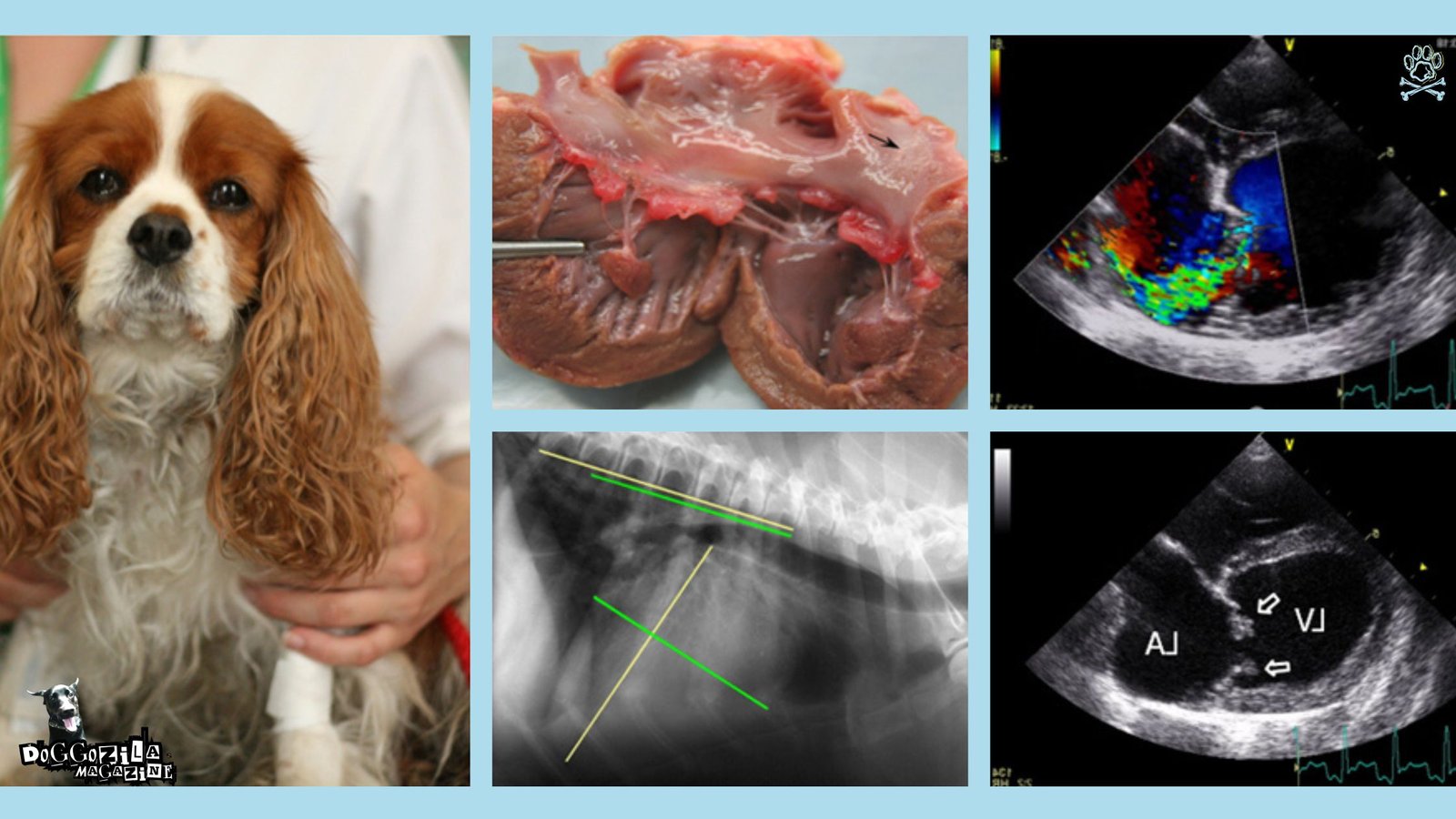Congestive heart failure in dogs (CHF) is a serious and often misunderstood condition that affects countless pets worldwide. It occurs when the heart can no longer pump blood effectively, leading to a range of symptoms that can impact a dog’s quality of life.
While heart failure in dogs can be daunting for pet parents, advancements in veterinary medicine have made it possible to manage the condition and provide dogs with longer, happier lives.
In this article, we’ll explore the history of congestive heart failure in dogs, its causes, symptoms, and the latest treatments. We’ll also share real-life examples and research to help you better understand this condition and how to care for a dog with heart failure.

THE HISTORY OF CONGESTIVE HEART FAILURE IN DOGS: A VET PERSPECTIVE
Heart failure in dogs has been recognized for centuries, but our understanding of the condition has evolved significantly over time. Early veterinarians often struggled to diagnose and treat congestive heart failure in dogs, as the tools and knowledge needed to understand the condition were limited.
Early Observations of Congestive Heart Failure in Dogs
In the early days of veterinary medicine, heart failure in dogs was often misdiagnosed as general weakness or old age. Veterinarians relied on physical exams and observable symptoms, such as coughing or lethargy, to identify the condition. However, without advanced diagnostic tools, many cases of congestive heart failure in dogs went untreated.
Historical records show that heart failure was often attributed to natural aging, and treatments were limited to rest and dietary changes. It wasn’t until the 20th century that veterinarians began to understand the true nature of the condition.
The Rise of Veterinary Cardiology
The field of veterinary cardiology emerged in the mid-20th century, bringing new insights into congestive heart failure in dogs. Advances in diagnostic technology, such as X-rays and electrocardiograms, allowed veterinarians to better understand the structure and function of the heart.
This led to more accurate diagnoses and the development of targeted treatments for heart failure in dogs. The establishment of specialized veterinary cardiology clinics further improved the quality of care, enabling veterinarians to focus on heart-related conditions. Today, veterinary cardiologists play a critical role in managing congestive heart failure in dogs.
Modern Advances in Treating Congestive Heart Failure in Dogs
Today, heart failure in dogs is a well-studied condition, with a range of treatment options available. From medications to surgical interventions, veterinarians can now manage congestive heart failure in dogs more effectively than ever before. Ongoing research continues to improve our understanding of the condition and its impact on dogs’ lives.
Breakthroughs in genetics, pharmacology, and imaging technology have revolutionized how we diagnose and treat heart failure in dogs. These advancements have not only extended the lives of affected dogs but also improved their quality of life.
🔑 Key Points: In the 20th century that veterinarians began to understand the true nature of the condition. The field of veterinary cardiology emerged in the mid-20th century, bringing new insights into congestive heart failure in dogs.

CAUSES OF CONGESTIVE HEART FAILURE IN DOGS: WHAT YOU NEED TO KNOW
Heart failure in dogs can be caused by a variety of factors, including congenital defects, age-related changes, and underlying health conditions. Understanding these causes is key to preventing and managing the condition.
Congenital Heart Defects
Some dogs are born with heart defects that can lead to heart failure later in life. Breeds like Cavalier King Charles Spaniels and Boxers are particularly prone to congenital heart conditions. Early detection through regular veterinary check-ups can help manage these issues before they progress to congestive heart failure in dogs.
Congenital defects such as patent ductus arteriosus (PDA) and subaortic stenosis are common culprits. Surgical correction of these defects, when possible, can significantly reduce the risk of congestive heart failure in dogs.
Age-Related Changes
As dogs age, their hearts can weaken, making them more susceptible to heart failure. Degenerative valve disease, a common condition in older dogs, is a leading cause of congestive heart failure in dogs. Regular monitoring and early intervention can help slow the progression of the disease.
Small breeds, such as Dachshunds and Chihuahuas, are especially prone to age-related heart issues. Routine veterinary visits, including heart screenings, are essential for early detection and management of these conditions.
Underlying Health Conditions
Conditions like obesity, high blood pressure, and heartworm disease can increase the risk of heart failure in dogs. Managing these conditions through diet, exercise, and preventive care can reduce the likelihood of heart failure developing. For example, heartworm disease in dogs, if left untreated, can cause irreversible damage to the heart and lungs.
Regular heartworm prevention and prompt treatment of infections are critical in preventing congestive heart failure in dogs. Additionally, maintaining a healthy weight and managing chronic conditions like diabetes can also play a significant role in heart health.
🔑 Key Points: Early detection through regular veterinary check-ups can help you to manage any hearth issues before they progress to congestive heart failure in dogs.

SYMPTOMS OF CONGESTIVE HEART FAILURE IN DOGS: RECOGNIZING THE SIGNS
Recognizing the symptoms of congestive heart failure in dogs is crucial for early diagnosis and treatment. While symptoms can vary depending on the severity of the condition, there are several common signs to watch for.
Persistent Coughing
A persistent cough, especially at night or after exercise, is a common symptom of congestive heart failure in dogs. This occurs when fluid builds up in the lungs, putting pressure on the airways. If your dog develops a chronic cough, it’s important to consult your veterinarian.
The cough may sound wet or hacking and is often worse when the dog is lying down. In some cases, the cough may be accompanied by gagging or retching, which can be distressing for both the dog and the owner.
Lethargy and Weakness
Dogs with heart failure often experience lethargy and weakness due to reduced blood flow and oxygen delivery. They may tire easily during walks or play and seem less interested in activities they once enjoyed. These changes can be subtle but are important to note.
You may also notice your dog sleeping more than usual or struggling to keep up with their normal routine. Lethargy is often one of the first signs pet parents notice, and it should never be ignored.
Difficulty Breathing
Labored breathing or rapid breathing, even at rest, is a hallmark symptom of congestive heart failure in dogs. This occurs as fluid accumulates in or around the lungs, making it harder for dogs to breathe comfortably. If you notice your dog struggling to breathe, seek veterinary care immediately.
In severe cases, dogs may adopt a “standing” position with their elbows spread wide to help expand their chest and improve airflow. This is a sign of significant respiratory distress and requires urgent attention.
🔑 Key Points: Understanding these signs and monitoring changes in a pet’s habits or demeanor can assist in the early detection of heart disease. By staying alert to these symptoms, pet owners can facilitate prompt veterinary care, which may ultimately enhance their dog’s quality of life.

DIAGNOSING CONGESTIVE HEART FAILURE IN DOGS: TOOLS AND TECHNIQUES
Diagnosing heart failure in dogs requires a combination of physical exams, diagnostic tests, and imaging techniques. Early and accurate diagnosis is essential for effective treatment.
Physical Exams and History
During a physical exam, your veterinarian will listen to your dog’s heart and lungs for abnormal sounds, such as murmurs or crackles. They’ll also ask about your dog’s medical history and symptoms to assess the likelihood of congestive heart failure in dogs.
A thorough history helps the veterinarian understand the progression of symptoms and identify potential risk factors. For example, a history of heartworm infection or a family history of heart disease can provide important clues.
Diagnostic Tests
Blood tests, X-rays, and electrocardiograms (ECGs) are commonly used to diagnose heart failure in dogs. These tests provide valuable information about the heart’s size, shape, and function, helping veterinarians identify the underlying cause of the condition.
Blood tests can reveal elevated levels of certain enzymes that indicate heart stress or damage. X-rays, on the other hand, can show fluid buildup in the lungs or an enlarged heart, both of which are common in heart failure in dogs.
Advanced Imaging
Echocardiograms, or heart ultrasounds, are the gold standard for diagnosing congestive heart failure in dogs. This non-invasive test allows veterinarians to visualize the heart in real-time, assessing its structure and function in detail.
Echocardiograms can reveal abnormalities such as thickened heart walls, leaky valves, or reduced pumping ability. These findings help veterinarians tailor treatment plans to the specific needs of each dog, ensuring the best possible outcomes.
🔑 Key Points: Ongoing management is crucial in cases of congestive heart failure in dogs. Continuous observation and communication with a veterinary professional can make a significant difference in managing this chronic condition effectively.

TREATING CONGESTIVE HEART FAILURE IN DOGS: A MULTIFACETED APPROACH
Treating congestive heart failure in dogs often involves a combination of medications, lifestyle changes, and, in some cases, surgical interventions. The goal is to improve quality of life and slow the progression of the disease.
Medications for Congestive Heart Failure in Dogs
Medications like diuretics, ACE inhibitors, and pimobendan are commonly prescribed to manage congestive heart failure in dogs. Diuretics help remove excess fluid from the body, while ACE inhibitors and pimobendan improve heart function and blood flow.
These medications are often used in combination to address different aspects of the condition. For example, diuretics reduce fluid buildup, while pimobendan strengthens the heart’s contractions, making it easier for the heart to pump blood effectively.
Dietary Changes
A low-sodium diet is often recommended for dogs with heart failure, as it helps reduce fluid retention and ease the workload on the heart. Your veterinarian may also suggest supplements like omega-3 fatty acids to support heart health.
Omega-3s have anti-inflammatory properties and can help improve circulation. Additionally, feeding smaller, more frequent meals can reduce the strain on the heart and make it easier for your dog to digest food.
Surgical Options
In severe cases of heart failure in dogs, surgical interventions like valve repair or pacemaker implantation may be necessary. These procedures are typically reserved for dogs with advanced disease or specific heart defects.
For example, dogs with severe mitral valve disease may benefit from valve repair surgery, which can significantly improve their quality of life. Pacemakers, on the other hand, are used to treat abnormal heart rhythms that can worsen heart failure in dogs.
🔑 Key Points: Once diagnosis is confirmed, treatment options can be tailored to meet the specific needs of the affected dog. Medications and dietary changes may be recommended! In certain cases of severe heart failure, surgical interventions may be necessary to address structural problems affecting the heart.

REAL-LIFE STORIES: DOGS LIVING WITH HEART FAILURE
Many dogs with heart failure go on to live happy, fulfilling lives with proper care and management. These real-life stories highlight the resilience of dogs and the importance of early intervention.
Max the Golden Retriever
Max was diagnosed with heart failure at age 8 after his owner noticed a persistent cough and lethargy. With a combination of medications and dietary changes, Max’s symptoms improved, and he continued to enjoy walks and playtime for several more years.
His owner also made sure to monitor his activity levels and provide plenty of rest, which helped Max maintain a good quality of life. Max’s story is a testament to the power of early diagnosis and consistent care.
Bella the Dachshund
Bella, a 10-year-old Dachshund, developed heart failure due to degenerative valve disease. Her owner worked closely with their veterinarian to manage her condition, and Bella lived comfortably for another three years with the help of medication and regular check-ups.
Bella’s owner also invested in a comfortable bed and elevated food bowls to make her daily life easier. Her story shows how small adjustments can make a big difference for dogs with heart failure.
Rocky the Boxer
Rocky, a Boxer with a congenital heart defect, was diagnosed with heart failure at a young age. Thanks to early detection and a tailored treatment plan, Rocky’s condition was managed effectively, allowing him to live a full and active life.
His owner also incorporated gentle exercise, like short walks and swimming, to keep Rocky’s heart healthy without overexerting him. Rocky’s story highlights the importance of a proactive approach to managing congestive heart failure in dogs.
🔑 Key Points: These real-life stories are telling about the resilience of dogs and the importance of early intervention. It’s important to remember that many dogs with heart failure go on to live happy, fulfilling lives with proper care and management.

THE FUTURE FOR HEART FAILURE IN DOGS: RESEARCH AND INNOVATIONS
Ongoing research is paving the way for new treatments and improved outcomes for dogs with heart failure. From cutting-edge medications to innovative surgical techniques, the future looks promising.
Advances in Medications
Researchers are developing new medications that target specific pathways involved in heart failure in dogs. These drugs aim to improve heart function and reduce symptoms with fewer side effects.
For example, new classes of diuretics are being tested to provide more effective fluid control without causing electrolyte imbalances. These advancements could revolutionize how we manage congestive heart failure in dogs.
Stem Cell Therapy
Stem cell therapy is an emerging treatment option for heart failure in dogs. Early studies suggest that stem cells may help repair damaged heart tissue and improve overall heart function.
While still in the experimental stages, this therapy holds great promise for dogs with advanced heart failure. Researchers are also exploring ways to use stem cells to regenerate heart valves, which could eliminate the need for surgical replacements.
Personalized Treatment Plans
Advances in genetic testing and diagnostic tools are enabling veterinarians to create personalized treatment plans for dogs with heart failure. These tailored approaches ensure that each dog receives the most effective care based on their unique needs.
For example, genetic testing can identify specific mutations that contribute to heart disease, allowing veterinarians to target treatments more precisely. This personalized approach could significantly improve outcomes for dogs with heart failure.
🔑 Key Points: From cutting-edge medications to innovative surgical techniques, the future for treating this condition looks promising. That’s why it’s important to stay in regular touch with the advances of veterinary medicine and to educate yourself always, on places like our magazine!

CARING FOR DOGS WITH CONGESTIVE HEART FAILURE
Taking care of a dog diagnosed with congestive heart failure (CHF) requires careful attention to various aspects of their daily life. One of the primary adjustments involves modifying exercise routines. While regular physical activity is essential for maintaining overall health, it’s important to tailor your dog’s activity level to their specific condition. Short, gentle walks are often beneficial, helping to keep their heart strong without overexertion.
Remember That Dogs with This Condition Can Have a Long and Happy Life
It’s prudent to consult with a veterinarian regarding a personalized exercise plan, ensuring that you strike the right balance between activity and rest. In addition to exercise modifications, dietary considerations play a significant role in managing congestive heart failure.
A heart-healthy diet, which may include lower sodium and high-quality ingredients, can help reduce the workload on the heart. Discussing specific dietary needs with a veterinarian is advisable, as they may recommend specialized dog foods designed for heart health.
Monitoring your dog’s weight is crucial; maintaining a healthy weight can alleviate stress on their cardiovascular system. Adjusting portion sizes and monitoring caloric intake can aid in weight management. Caring for a dog with CHF can also be emotionally challenging. Pet owners often experience a range of feelings, from anxiety to sadness, as they navigate the complexities of their pet’s health condition.
Let’s Circle Back to the Important Points
Congestive heart failure (CHF) in dogs is a serious condition that occurs when the heart’s ability to pump blood effectively diminishes. This inadequate blood circulation can lead to a buildup of fluid in the lungs and other areas of the body, making it a critical issue for pet health.
It is essential for pet owners to recognize the symptoms and seek timely veterinary care to enhance their dog’s quality of life. Identifying the symptoms of CHF early can significantly improve your dog’s prognosis. Common signs include persistent coughing, rapid or labored breathing, lethargy, and a reduced exercise tolerance.
You may also notice fluid accumulation in the abdomen, leading to noticeable swelling. In some cases, affected dogs might exhibit a bluish tint to their gums or tongue due to insufficient oxygen in the bloodstream. If you observe these symptoms in your pet, consulting a veterinarian promptly is crucial for effective treatment.
Our Final Takeaway
While CHF in dogs is not curable, it can be managed with proper veterinary care. Treatments often include medications to help the heart pump more efficiently and to alleviate fluid buildup. Regular monitoring and veterinary check-ups play a vital role in managing this condition effectively, allowing your dog to maintain a better quality of life. As a caring dog owner, understanding congestive heart failure in dogs is vital.
By educating yourself about its symptoms and treatment options, you can become an advocate for your pet’s health and well-being. Always maintain an open line of communication with your veterinarian, and don’t hesitate to express any concerns you have regarding your dog’s heart health. Together, you can work towards giving your beloved pet the best possible care.
Finding ways to cope with this emotional burden is vital. Joining support groups, either online or in-person, can provide comfort and camaraderie among other pet owners facing similar situations. Moreover, staying in regular contact with your veterinarian can offer additional insights and reassurance, helping you feel more secure in your pet’s care journey.
Various resources are available for pet owners managing this condition, including pet health websites and veterinary clinics that specialize in cardiology. By seeking guidance and support, you can provide a loving and nurturing environment for your dog during this challenging time.









